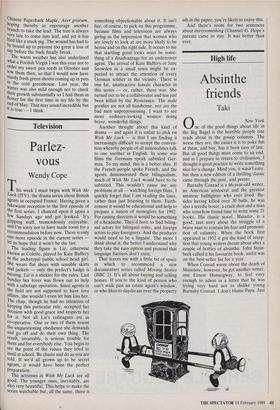Television Parlez-
Wendy Cope
This week I must begin with Wish Me Luck (ITV), the drama series about British agents in occupied France. Having given a lukewarm reception to the first episode of the first series, I chanced upon it again a few Sundays ago and got hooked. It's gripping stuff, tremendously enjoyable, and I'm sorry not to have made room for a recommendation before now. There is only one more episode in the current series let us hope that it won't be the last.
The leading figure is Liz, otherwise known as Colette, played by Kate Buffery as the archetypal public school head girl. She wears flat shoes with sensible skirts and jackets — only the prefect's badge is missing. Liz is a stickler for the rules. Last Sunday her lover was flown out to help with a sabotage operation. Since agents in the field are not supposed to have love affairs, she wouldn't even let him kiss her. The chap, though he had no intention of keeping this particular rule, accepted her decision with good grace and respects her for it. Not all Liz's colleagues are as co-operative. One or two of them resent the unquestioning obedience she demands and go off and do their own thing. The result, invariably, is serious trouble for them and for everybody else. You begin to see the point of the values they tried to Instil at school. Be chaste and do as you are told. If we'd all grown up to be secret agents, it would have been the perfect preparation.
The actresses in Wish Me Luck are all good. The younger ones, inevitably, are also very beautiful. This helps to make the series watchable but, all the same, there is
something objectionable about it. It isn't fair, of course, to pick on this programme, because films and television are always giving us the impression that women who are lovely to look at are more likely to be heroic and on the right side. It occurs to me that startling good looks must be some- thing of a disadvantage for an undercover agent. The arrival of Kate Buffery or Jane Snowden in a small town might be ex- pected to attract the attention of every German soldier in the vicinity. There is one fat, unattractive female character in this series — or, rather, there was. She turned out to be a collaborator and has just been killed by the Resistance. The male goodies are not all handsome, nor are the bad men unprepossessing. I want to see more ordinary-looking women doing brave, wonderful things.
Another thought about this kind of drama — and again it is unfair to pick on Wish Me Luck — is that I am finding it increasingly difficult to accept the conven- tion whereby people of all nationalities talk to one another in English. In some war films the Germans speak subtitled Ger- man. To my mind, this is a better idea. If the French people spoke French, and the agents demonstrated their bilingualism, much of Wish Me Luck would have to be subtitled. This wouldn't cause me any problems at all — watching foreign films, I quickly forget that I am reading the lines, rather than just listening to them. Furth- ermore it would be educational and help to prepare a nation of monoglots for 1992. For casting directors it would be something of a headache. They'd have to find biling- ual actors for bilingual roles, and foreign actors to play foreigners. And the producer would need to be a linguist. The more I think about it, the better I understand why they take the easy option and pretend that language barriers don't exist.
That leaves me with a little bit of space in which to recommend a new documentary series called Moving Stories (BBC 2). It's all about buying and selling homes. If you're the kind of person who can't walk past an estate agent's window, or who likes to daydream over the property
ads in the paper, you're likely to enjoy this.
And there's room for two sentences about thirtysomething (Channel 4). Hope's parents came to stay. It was better than ever.


















































 Previous page
Previous page